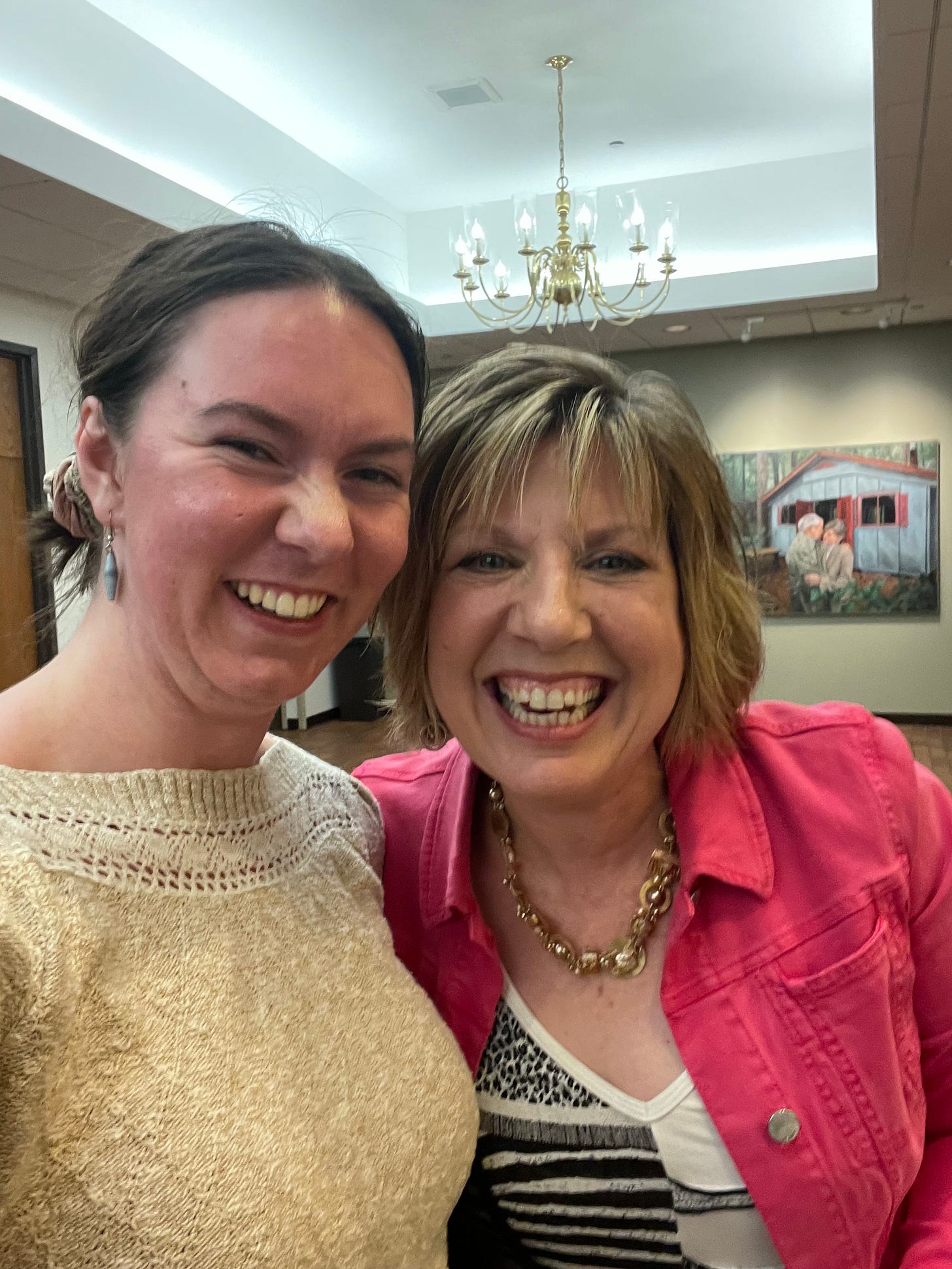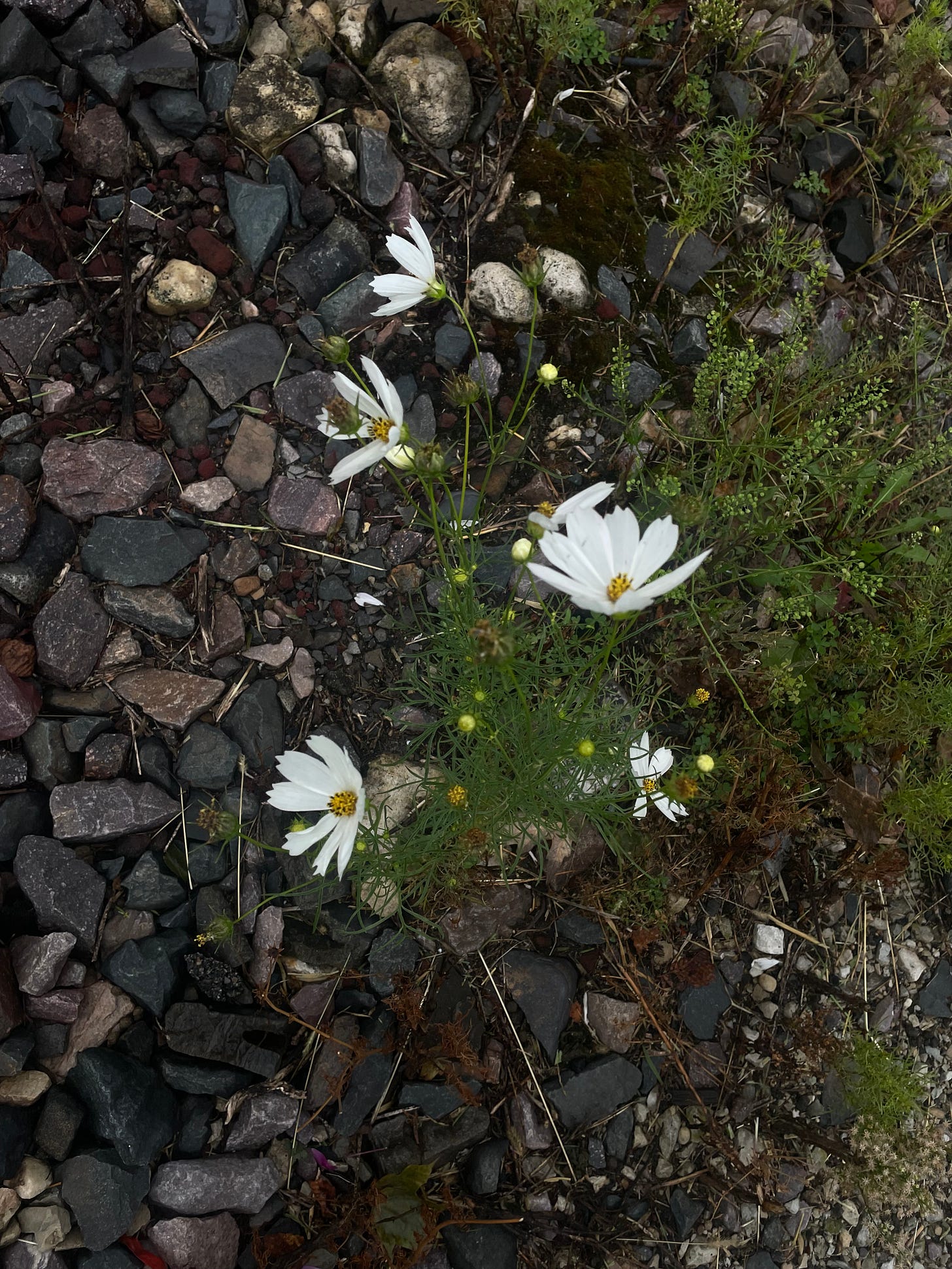Decomposition and Whale Songs
+ a crossover episode with Sheila Gregoire!
“But truth, like zucchini plants and deer carcasses, has a way of getting out of hand.”
—Abbi Fisher, “Decomposition”
Welcome back, readers old and new!
A few years ago, some friends and I made a whimsical short film about harmful messages in bestselling evangelical marriage books.
We based it on the largest survey (featuring 20,000 women) ever done about evangelical women’s marital and sexual satisfaction, which was conducted by Sheila Wray Gregoire, Rebecca Lindenbach, and Joanna Sawatsky, and formed the basis for their book The Great Sex Rescue. (We were very chill teenagers, as you can tell.)
It went a little viral. My (dear friend and) co-director Abbi and I were interviewed by Sheila Gregoire on her podcast—the one that started our journey with the material.
Well. I am now a student in Chicago. Last week I took a solo wander by train and…
Met my favorite author in person!
Before I change the subject to talk about trains and Ben Hatke (the author/illustrator who, this spring, circumnavigated the whole earth by land and by sea), I want you to take a moment and think about the word “vaginismus.”
Are you familiar with it? Look it up! When was the last time you talked about vaginismus (especially the rate of primary sexual pain experienced by evangelical women compared to the rate it is experienced by the general population) with a friend?
Okay. Time to talk about trains.
“Pilgrims are poets who create by taking journeys.”
—H. Richard Niebuhr
This is Ben Hatke, an author/illustrator/archer/fire-breather/acrobat/puppetmaker who is most well known for his middle grade graphic novels:
I thought about Ben Hatke’s Patreon updates about the steps of his travail as I dumped the school books out of a green canvas backpack and packed it with a few essentials to spend the night with the strangers (friends-of-a-friend) who had generously agreed to let me stay overnight. I thought about his trip as I passed rickshaws on the road, and as I sat in the train as it rattled away from the city into lands of myth and legend (Wheaton, IL, as mythological a place as any to some members of my family).
It was my first taste of solo travel.
A lot of adrenaline was involved because I am still learning how to navigate in the city.
There are not mountains in Illinois. it took me a few hours to forgive Wisconsin for its lack of mountains and then appreciate it for its own Shire-like landscape, and its resemblance to the Garth Williams illustrations of my youth.
But the midwest does have cosmos that grow along the train tracks.
Next time maybe I’ll take the train to an SCA event. I think all of you who subscribe to LNR would love Ben Hatke’s Patreon (you can see a lot or all of it for free I believe).
I love his books. And the extensive eccentric unschooled special interests of the extended Hatke family.
Of the two pieces of art I brought from Montana to Chicago, one of them was an art print of a Ben Hatke painting of Reynard the Fox, a medieval trickster character, carefully packaged in cardboard and duct tape by my younger brother.
Speaking of the Hatke family:
Cradles and caskets. Here is an essay about grief by Anna Hatke.
The world-wood is different one year later. One can see through the trees now to the river shimmering on its journey. The stones peep up from the periwinkle. Wildflowers have moved in where the honeysuckle has been pulled and the saplings are growing. A small crowd gathers by the grave of my daughter. We bring flowers and light candles. We open our voices in song. It is the third sound of grief. ‘In hac lacrimarum valle… In this valley of tears’, we sing. Time seems to buckle and fold back on itself like the syncline folds of the mountains which overlook my world-wood. The years compress as the Latin words of a song sung during the bubonic plague echo in a new pandemic and tears for my daughter mingle with the hasty tears of those enslaved 200 years previously.
—Anna Hatke, Requiem for a World-Wood
I have been thinking about being in a place. Navigating and knowing where you are.
Penned in by the desolate weather, she recaptured the sense of space which the motor had tried to rob from her. She remembered again that ten square miles are not ten times as wonderful as one square mile, that a thousand square miles are not practically the same as heaven. The phantom of bigness, which London encourages, was laid for ever when she paced from the hall at Howards End to its kitchen and heard the rains run this way and that where the watershed of the roof divided them.
—E. M. Forster, Howard’s End, from chapter 23
I have felt some homesickness.
I also feel at home now.
I finished a container of floss that I used only in Chicago. My container of raw honey is getting low.
These are signs of being at home to me.
I’ve been able to give home to some people, mutually listening to our stories of home, friends who are fellow students and friends who are refugees.
“In difficult times, organisms find new symbiotic relationships in order to expand their reach. Crisis is the crucible of new relationships.”
—Merlin Sheldrake
I’ve cried over the alps in the opening of The Sound of Music (that’s what the land around my home in Montana looks like) while hemming the apron I sewed last year for my short film Flora. I sat in a coffee shop with 2010s music featuring bells and claps and someone’s phone rang with an alarm that my dad uses. I thrifted alone here for the first time. I played a borrowed accordion by an elevator. I watched Psych and ate chips and picante sauce. I laughed countless times with my friends here and swam in Lake Michigan and climbed a tree with my roommate and hung out with my community.
I painted this here motivational dish-washing painting for my floor kitchen.
I ate a meal at an Orthodox church I didn’t mean to return to, around a table with an elderly couple with a retired theatre professor, a fellow college student, and a choir director who was talking about his Tolkien book club and about Tolkien and the trickiness of translating Beowulf because of its poetic structure; he used “whale-road” as an example of a kenning, like my friend back in Montana does when he has given the same spiel. I felt at home there.
Learning a path is a long, patient process. A friend of ours has hiked the same trail near his home once or twice a week for many years. Other trails thread nearby hills, and he travels them when invited, but the trail he knows and loves is his; he has a claim on it that can only be won by long, patient, appreciative intimacy. He knows every patch of shade, where the sounds of water become inaudible, which part gets muddy first in the January rain. He knows it in ways that go far beyond navigation. His path has become a way of knowing himself. The stretch of solitude it allows him enables and shapes the ongoing conversation with himself that has furnished his “interior castle.”
—Marilyn McIntyre, What’s in a Phrase? Pausing Where Scripture Gives You Pause
Photo by Nia <3
A warm and happiest of congratulations to the newly wedded, whimsical, bird-loving couple o’ vikings in Montana!
Since this issue of LNR has ironically featured All the Books, here is a song of hope and love and wholeness for you two as you begin …
A Quote:
And if I wanted to write about something a little happier, something that I learned from in a way that I could wish upon others, they were all too fresh. Fruit and vegetables that had grown till they split open and now nestled deep into the mulch where they would lay in gentle repose until their life was given to feed something beautiful. But too many had been picked even just this summer. They were still just a bunch of woody squash and dried out softball size beets.
—Abbi Fisher









